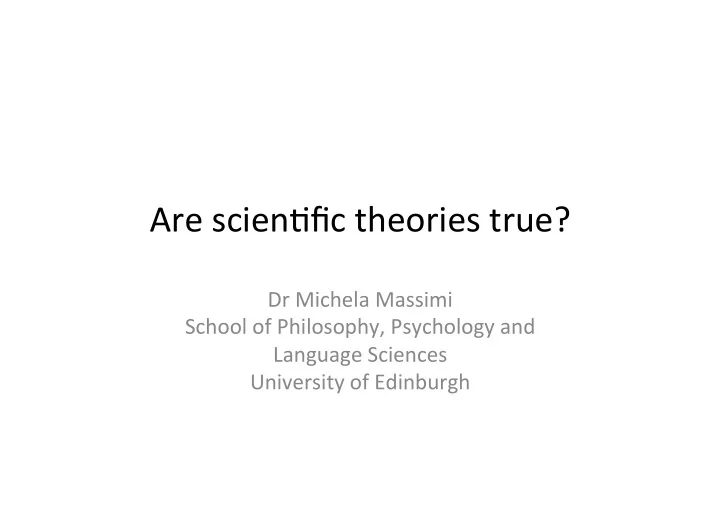

Are$scien)fic$theories$true?$ Dr$Michela$Massimi$ School$of$Philosophy,$Psychology$and$$ Language$Sciences$ University$of$Edinburgh$
Structure$ 1. Introduc)on$ 2. Ancient$Greek$astronomy$and$Duhem$on$ “saving$the$phenomena”$ 3. From$Copernicus$to$Galileo$$ 4. Scien)fic$realism$ 5. Scien)fic$an)Orealism$ 6. Inference$to$the$best$explana)on:$realism$ vindicated?$ 7. Conclusion$
1.$Introduc)on$ Two$possible$aims$for$science:$ $ i. The$aim$of$science$is$to$“save$the$ phenomena”$(scien)fic$an)Orealism)$ OR$ ii.$$The$aim$of$science$is$to$tell$us$a$true$story$$$$$ about$nature$(scien)fic$realism)$
2.$Ancient$Greek$astronomy$and$ Duhem$on$“saving$the$phenomena”$ $
3.$From$Copernicus$to$Galileo$$ $ • Copernicus’$dedicatory$le[er$to$Pope$Paul$III:$ $ “I$began$myself$to$consider$the$movement$of$the$Earth.$It$ seemed$an$absurd$no)on.$Yet$I$knew$that$my$ predecessors$had$been$granted$the$liberty$to$imagine$all$ sorts$of$fic)ve$circles$to$save$the$celes)al$phenomena.$I$ therefore$thought$that$I$would$be$similarly$granted$the$ right$to$experiment,$to$try$out$whether,$by$assigning$a$ certain$movement$to$the$earth,$I$might$be$able$to$find$ more$solid$demonstra)ons$of$the$revolu)ons$of$the$ celes)al$spheres$than$those$le]$by$my$predecessors”.$$ $ [from$P.$Duhem,$ To#Save#the#Phenomena ,$English$ed.$ 1969,$University$of$Chicago$Press,$p.$63]$ $
• Osiander’s$Preface$to$Copernicus’$ De#revolu1onibus:# # “For$the$astronomer’s$job$consists$of$the$following:$to$ gather$together$the$history$of$the$celes)al$movements$by$ means$of$painstakingly$and$skillfully$made$observa)ons… and$then$to$think$up$or$construct$whatever$hypotheses$ he$pleases$such$that$on$their$assump)on,$the$selfOsame$ movements,$past$and$future$both,$can$be$calculated$by$ means$of$the$principles$of$geometry….$It$is$not$necessary$ that$these$hypotheses$be$true.$They$need$not$even$be$ likely.$This$one$thing$suffices$that$the$calcula)on$to$which$ they$lead$agree$with$the$result$of$observa)on”.$$ [from$P.$Duhem,$ To#Save#the#Phenomena ,$English$ed.$ 1969,$University$of$Chicago$Press,$p.$66]$ $
• Galileo$and$the$telescope:$ $ i. Mountains$on$the$Moon$ ii. Jupiter’s$satellites$ iii. Phases$of$Venus$ $ Galileo$embraced$Copernicanism$as$a$physical$ truth .$ $ $
4.$Scien)fic$realism$ Scien)fic$realism$is$the$view$that$scien)fic$ theories,$once$literally$construed,$aim$to$give$us$ a$true$story$of$the$way$the$world$is.$ $ Seman)c$aspect$of$the$above$def.$ $ Epistemic$aspect$of$the$above$def.$
Seman)c$aspect$of$the$above$def.$ $ We$should$take$the$ language'of'science' at$face$ value.$This$means$the$following:$ $ • We$should$take$theore)cal$terms$(e.g.$terms$of$a$ scien)fic$theory,$say$“electron”,$“nega)ve$ charge”,$…)$as$ referring'to,' or$ picking'out' real$ en))es$or$proper)es$in$the$world$(“electron”$ refers$to$the$electron)$ • We$should$also$take$the$sentences$of$our$ scien)fic$theories$(e.g.$“electrons$have$nega)ve$ electric$charge)”$as$ corresponding'to' real$states$ of$affairs$in$the$world$(electrons$ really $do$have$ nega)ve$electric$charges)$ $
$ Epistemic$aspect$of$the$above$def.$ $ Acceptance$of$a$scien)fic$theory$implies$the$belief$ that$the$theory$is$true.$$ $ E.g.:$accep)ng$the$electron$theory$implies$believing$ that$the$electron$theory$is$true.$ $ Namely,$we$believe$that$the$theore)cal$terms$ (“electrons”$and$“nega)ve$charges”)$ refer'to' real$ en))es$and$proper)es$in$the$world,$and$we$also$ believe$that$what$the$theory$says$about$electrons$ and$nega)ve$charges$ correspond'to' real$states$of$ affairs$in$the$world.$ $
• The$NoOMiracles$ Argument$(NMA)$for$ scien)fic$realism$$ (Hilary$Putnam,$1975,$p.$ 73):$ “the$posi)ve$argument$for$ realism$is$that$it$is$the$only$ philosophy$that$does$not$ make$the$success$of$ science$a$miracle”$
5.$Scien)fic$an)realism$ • Bas$van$Fraassen’s$“construc)ve$ empiricism”$( The#Scien1fic# Image,# 1980,$Clarendon$Press).$ • Agree$with$the$seman)c$aspect$ in$the$def.$of$realism$ $ • But$disagree$with$the$epistemic$ aspect:$scien)fic$theories$need$ not$be$true$to$be$good.$
Observable' vs.$ unobservable' dis)nc)on:$ • Observable# phenomena$are$all$past,$present,$and$ future$phenomena$that$a$theory$can$save$(not$just$ the$actual$ observed# phenomena!).$They$are$ observable$because$they$are$ observable>to>us, $i.e.,$ they$can$be$observed$ with'our'naked'eyes .$ • $ Unobservable# en))es,$on$the$other$hand,$are$those$ that$cannot$be$in$principle$observed$with$our$naked$ eyes.$
Examples$ • Observable)phenomena :$zebras,$elm$trees,$ fossils,$but$also$Moons$of$Jupiter$(astronauts$ could$take$a$spaceship$and$have$a$close$look$ at$them)$and$so$on…$ • Unobservable)phenomena :$bacteria,$viruses,$ DNA$strands,$electrons,$protons,$quarks,$and$ so$on…$(do$what$we$may,$we$can$never$ achieve$an$unaided$vision$of$any$of$these$ en))es$with$our$naked$eyes).$$ #
• Science$aims$to$give$us$theories$which$are$ empirically'adequate ;$and$acceptance$of$a$ theory$involves$as$a$ belief $only$that$the$theory$is$ empirically'adequate .$ • A$theory$is$ empirically#adequate $if$what$it$says$ about$the$ observable $things$and$events$in$the$ world$is$ true $–$i.e.,$if$it$ saves#the#phenomena.#
Truth$vs.$empirical$adequacy$ If$a$scien)fic$theory$is$true$(in$the$ scien)fic$realist$sense),$then$it$is$ also$empirically$adequate$(in$van$ Fraassen’s$sense).$ $ E.g.:$if$the$electron$theory$is$true$ (as$defined$above,$i.e.$there$really$ are$electrons,$and$they$do$have$ nega)ve$charges…),$then$it$is$also$ empirically$adequate$(e.g.,$it$can$ save$the$ observable'phenomena' about$electrons,$say$the$greenish$ fluorescence$we$observe$in$ cathode$rays)$$$$$
• But$not$the$other$way$around:$empirical$ adequacy$does$not$imply$the$scien)fic$realist’s$ no)on$of$truth.$ • For$van$Fraassen,$the$electron$theory$is$ empirically$adequate$with$respect$to$the$ observable'phenomenon' of$the$greenish$ fluorescence$in$cathode$rays$(among$others),$ without$being$necessarily$true$(without$us$having$ to$believe$that$there$really$are$ unobservable' en))es$called$“electrons”,$having$really$nega)ve$ charges,$and$so$forth).$
• Van$Fraassen’s$Darwinian$response$to$ $the$NoOMiracles$argument:$$ Theories$are$ naturally'selected' in$such$a$way$ that$those$with$false$observa)onal$ consequences$are$discarded,$and$the$survivalO adap)ve$ones$are$those$that$ � fit$the$observable$ phenomena$or,$in$other$words,$save$the$ phenomena.$ $ The$success$of$science$is$not$miraculous$and$can$ be$explained$in$terms$of$empirical$adequacy, ' not$in$terms$of$ truth $with$respect$to$ unobservable #en11es !$ $
6.$Inference$to$the$Best$Explana)on:$ realism$vindicated?$ Two$realist$rejoinders$against$van$Fraassen’s$ construc)ve$empiricism:$ $ I. van$Fraassen’s$Darwinian$response$to$the$ NoOMiracles$argument$does$not$cut$any$ice.$ $ One$thing$is$to$explain$why$only$successful$ theories$survive;$another$thing$is$to$explain$why$ a$theory$is$successful$in$the$first$instance.$Only$ realism$can$explain$the$la[er.$
II.$Why$suspend$belief$about$unobservable$ en))es$(be$they$atoms,$electrons,$or$DNA)?$ $ Philip$Kitcher’s$and$Peter$Lipton’s$reply:$ $$ the$inferen)al$path$that$leads$to$ unobservable# en11es# is$one$and$the$same$with$the$inferen)al$ path$that$leads$to$ unobserved#observables $(e.g.$ ex)nct$species$like$trilobites$and$dinosaurs),$ namely$ $ Inference$to$the$Best$Explana)on$ $
Inference$to$the$Best$Explana)on$ $ We$infer$the$hypothesis,$which,$if$ true ,$would$ provide$the$ best#explana1on# for$the$available$ evidence.$
7.$Conclusion$ To$sum$up,$two$main$views$about$the$aims$of$ science:$ $ Scien1fic#realism# sees$ truth $as$the$main$aim$of$ science.$ $ Construc1ve#empiricism# sees$ empirical' adequacy' as$the$main$aim$of$science. # $
Recommend
More recommend